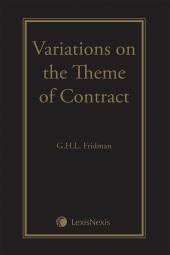Variations on the Theme of Contract
One Year Subscription Only Terms
Subscribers receive the product(s) listed on the Order Form and any Updates made available during the annual subscription period. Shipping and handling fees are not included in the annual price.
Subscribers are advised of the number of Updates that were made to the particular publication the prior year. The number of Updates may vary due to developments in the law and other publishing issues, but subscribers may use this as a rough estimate of future shipments. Subscribers may call Customer Support at 800-833-9844 for additional information.
Subscribers may cancel this subscription by: calling Customer Support at 800-833-9844; emailing customer.support@lexisnexis.com; or returning the invoice marked 'CANCEL'.
If subscribers cancel within 30 days after the product is ordered or received and return the product at their expense, then they will receive a full credit of the price for the annual subscription.
If subscribers cancel between 31 and 60 days after the invoice date and return the product at their expense, then they will receive a 5/6th credit of the price for the annual subscription. No credit will be given for cancellations more than 60 days after the invoice date. To receive any credit, subscriber must return all product(s) shipped during the year at their expense within the applicable cancellation period listed above.
Détails des produits
Professor Gerald Fridman was an internationally recognized expert in the law of contracts. Completed posthumously by Professor Rick Bigwood, Variations on the Theme of Contract is an authoritative, engaging text that offers Professor Fridman’s final thoughts on this complex, sometimes confusing, area of law.
A thorough review
Professor Fridman adopted a unique and creative structure for this publication which consists of a number of independent essays that address various aspects of the law of contract. The collection of essays is divided into a “Prelude” followed by 14 ”Variations,” each of which is introduced by an epigraph from a Stephen Sondheim musical – a nod to the late author’s love of musical theatre.
As Professor Fridman explains in the book’s opening “Prelude,” his “intention in presenting these essays is not to, as it were, tear the law of contract to pieces. Rather, it is to draw attention to developments that merit a critical appreciation.” To that end, Professor Fridman provides a close examination of the evolution and current state of key topics related to contract law, including the freedom of contract, consideration, privity, estoppel, misrepresentation, mistake, interpretation, contractual terms, performance, frustration and unjust enrichment. Throughout, he encourages readers to delve deeper into the subject matter as he fulfills his purpose – “to inform, educate and stimulate thought about the issues that have been raised, and, perhaps, at the same time, to provide some entertaining reading matter.”
An authoritative text
Variations on the Theme of Contract would be a useful addition to any lawyer’s bookshelf, but it would be a particularly valuable resource for:
- Members of the Canadian judiciary who might refer to it when rendering their decisions
- Canadian legal scholars who are conducting research in the area of contract law
- Civil litigation lawyers who could leverage the content to gain a better understanding of the intricacies of contract law and develop more robust arguments for their cases
- Law students who are studying contract law
- Law libraries that want to provide patrons with a comprehensive collection of legal reference materials
Table des matières
Prelude: The theme
I. Explaining, without deconstructing, contract
II. A note ad hominem
III. The importance and essence of contract
IV. The meaning and form of agreement
V. Communication
VI. Certainty
VII. Evolution
Variation 1: Freedom of contract
I. Contractual limitations
II. The conflict of freedom and consensus
III. Restriction of physical freedom
IV. Illegality
V. Inequality
VI. Avoidance of liability
VII. Requirements rather than restrictions
Variation 2: Considerations about consideration
I. What, why, when
II. Perform or pay?
III. An equitable variation
IV. Permanence
Variation 3: The demystification of privity
I. The idea of privity
II. And the reality
III. A significant departure
IV. A new exception?
V. Another novel exception?
VI. The present situation
VII. What a difference a seal makes
Variation 4: Contracting with the unknown
I. The evolution of contract
II. Requirements to be a principal
III. The emergence of undisclosed principals
IV. The ratification of unauthorized acts
V. The status of an undisclosed principal
VI. The status of the agent of an undisclosed principal
VII. Dealings between agent and principal or third party
VIII. The utility and disutility of undisclosed agency
Variation 5: The ambiguous utility of estoppel
I. What estoppel is and means
II. Estoppel in agency
III. Promissory estoppel
IV. Why ambiguity?
Variation 6: To err is human
I. A basis for invalidity
II. The nature and effect of mistake
III. Fundamental mistakes
IV. Unilateral mistakes
V. Bilateral mistakes
VI. Varieties of error
VII. An abstruse issue
Variation 7: Misstating the truth
I. Misrepresentation and mistake distinguished
II. Fraudulent misrepresentation
III. Negligent misrepresentation
IV. Innocent misrepresentation
V. Comparisons
Variation 8: Interpreting contracts
I. Core issues
II. Adding words to express terms
III. Adding terms to a contract
IV. Postscript: The desire for certainty
Variation 9: The structure of a contract
I. Tunes and terms
II. Conditions and warranties
III. Fundamental terms
IV. Innominate terms
V. The rationale of innominate terms
VI. Understanding a contract
Variation 10: Hors d’oeuvres
I. An unusual use of a word
II. Necessary requirements
III. Exclusion of such contracts
IV. How appetizing is the appetizer?
Variation 11: Contract satisfaction
I. The obligation to perform
II. Parsing the obligation
III. Other pertinent factors
IV. Release from the duty to perform
Variation 12: Contract disrupted
I. External causes
II. Grounds for impossibility or frustration
III. Rationale
IV. When impossibility or frustration does not apply
V. Consequences of the doctrine’s application
VI. The results of the present-day doctrine
Variation 13: The widespread sale of a defective chattel
I. A buyer’s rights
II. The problem stated
III. What is waiver of tort?
IV. The true juridical nature of waiver of tort
V. What torts do and do not support waiver
VI. The impact of this case on the law of contract
Variation 14: From quasi-contract to unjust enrichment
I. Beginnings
II. The era of implied contract
III. The principle of restitution
IV. The emergence and triumph of unjust enrichment
V. The role of unjust enrichment
 Lexis Nexis
Lexis Nexis 


